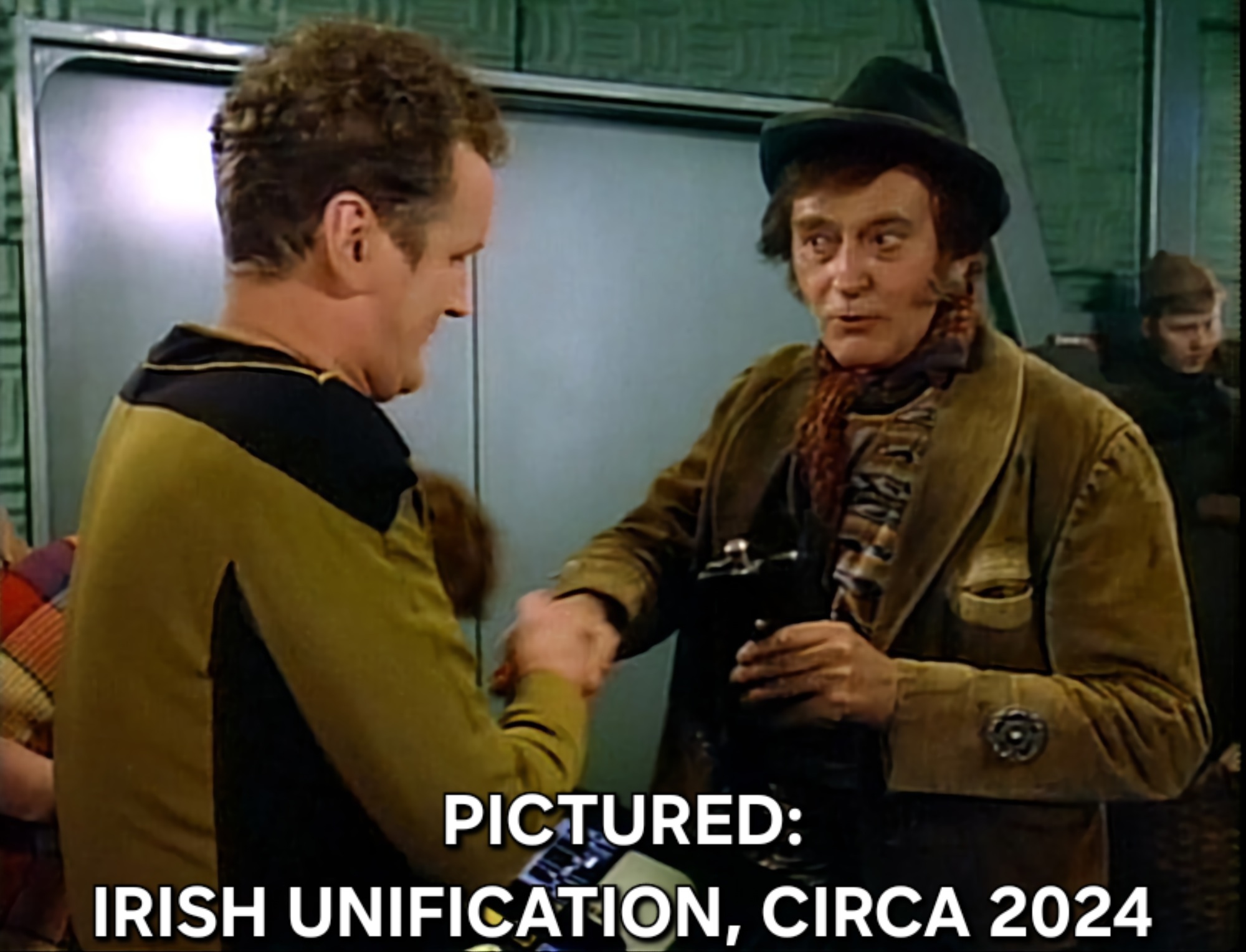cross-posted from: https://hexbear.net/post/1505645
Alt text: Screengrab from Star Trek: TNG showing Data saying to Picard “the Irish Unification of 2024”
This implies we could have gotten a TNG but someone changed the timeline
Year just started mate.

Starting the year out as an optimist I see!
Americans need to stop cosplaying as Irish and acting like they even remotely understand the situation.
I got really hopeful during Brexit that Ireland would unite and Scotland would leave.
Scotland could never leave. Britain doesn’t want to loose Scotland and Europe doesn’t want to split up all the British kingdoms and have them join one by one.
Northern Ireland has a chance to leave the shithole that is brexit by joining Ireland, but does Ireland want that? You’re gonna spark a fire if you do that. The politics and rebellions of the 80’s are only dormant, the sentiment is far from gone.
let’s just ignore how the pretext for this line was Data explaining how, sometimes, terrorism is an effective vehicle for social and/political change.
Sometimes it is effective. Just ask everyone who salivated over the PATRIOT act.
Now whether is justified is an entirely different story.
that was Data’s whole point. Then, just as Picard was about to dish out a bunch of huffy, self-righteous moral indignation, their conversation got cut off by an incoming message or some other rather convenient interruption. Trek was often bold in how it approached controversial sociopolitical subjects. And, sometimes, it scampered off without honestly addressing them.
this occasion was one of the latter.
edit: although, one could argue that, due to the fact that Data got his comment in before Picard was able to give a self-righteous counter-argument, the writers, in fact, were quite brave. The comment was so controversial, in fact, the episode was banned in several markets which refused to air this episode, and it still remains banned in some places to this day.
From Memory-Alpha:
Due to political sensitivity, as Ireland was still in the midst of the Troubles when “The High Ground” aired in 1990, the reference to Irish unification and terrorism in the episode resulted in its removal from first-run in the United Kingdom. To date, some syndicating networks will not air the episode, and it was only in 2007 (fifteen years after its first run, nine years after the conflict ended in a peaceful manner) that it was broadcast on the BBC.
In fairness, it’s less controversial and more that the line is outright offensive. At the time, people were being murdered by acts of terrorismin in the troubles, so to wontonly say that those attacks are effective and will get results was extremely insensitive. It’s sort of like saying 9/11 was an effective use of terrorism shortly after it happened, or the 2015 Paris attacks.
That being said, it’s still an interesting point that Data raises in the episode.
It’s sort of like saying 9/11 was an effective use of terrorism shortly after it happened
here’s the thing, though: by no measure could this statement be considered even remotely true. if someone, very boldly, were, today, try to make the argument that “the Troubles were worth it,” I dare say that they’d have a good case for that argument, despite the heavy controversy which would come with it. The argument you propose, conversely, lacks the obvious evidentiary support required to substantiate such… an ambitious arguments yours.
And I certainly don’t support it.
edit: it’s a matter of factual and evidentiary support. come back with evidence to support your claims.

Jesus christ that episode…
I dare anyone to Watch that and tell me casual racism against the Irish died out a long time ago…
Before today, it was Fuedal Ireland. Just a bunch of Irish warlords vying for control.







